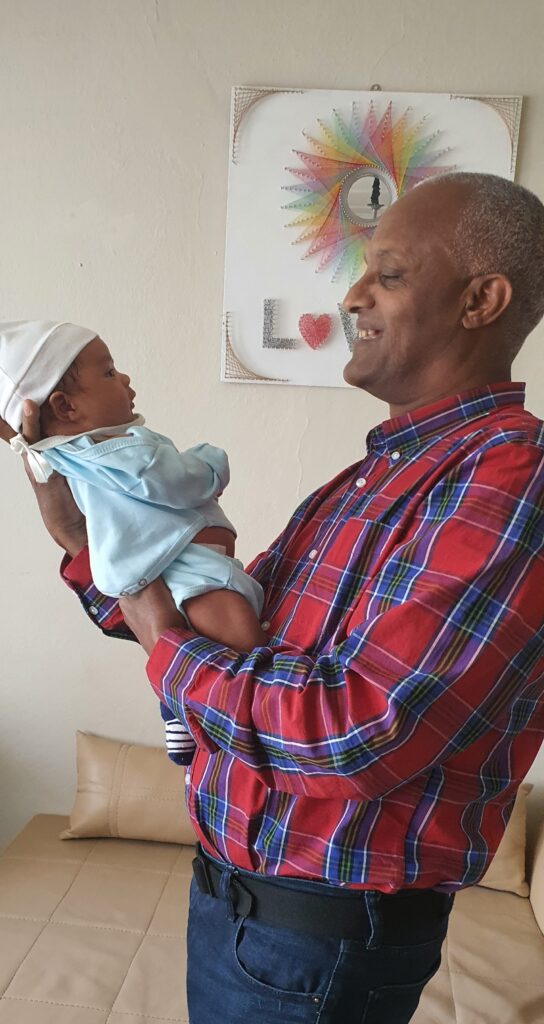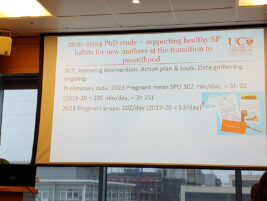Ethiopian parents frequently utter the phrase “Lij Bedilu Yadgal”, which can be translated as “Children will grow by their own chance/luck.” This proverb aptly captures the widespread misunderstanding about parenting and childcare in Ethiopian culture. There are severe life difficulties facing the people of Ethiopia, and parents who give their children a reasonable amount of food, shelter, and clothing are thought to have done enough for them. This, coupled with the absence of knowledge regarding the psychosocial, socio-emotional, and mental health needs of infants and children may lead to missed opportunities to promote other important aspects of children’s wellbeing. This in turn is exacerbated by the cultural belief that the root cause of mental illness is spiritual, and that traditional medicines, and cultural and religious practices are the best places to turn for help.
Infant and Child Mental Health in Ethiopia
Many infants and children worldwide, especially those in Low-Income Countries (LICs), experience mental health problems, but only few receive the care that they need. This is especially true for Ethiopia where infant and child mental health problems are becoming more common and complex. The prevalence rate of child mental illness in 2012/13 high (see below for further detail), with social and economic factors compounding the extent and severity of mental illness. For example, a recent report suggests 36 million children face multi-dimensional poverty, 4.7 million children under the age of 5 are malnourished, including 1.2 million being severely malnourished. There are over 5.5 million children under the age of 5 stunted, including 1.8 million severely stunted, and almost 45% of child deaths are associated with undernutrition (UNICEF, 2022, p.9).
Ethiopia, one of the world’s low-income countries (LICs), has a population of over 120 million, of which 80% live in rural areas, with a Human Development Index of 0.498 (UNDP, 2022). Although the country was hailed for its fast infrastructure development-driven economic growth, for some time now, it has been experiencing political, economic, and social upheavals that have had a detrimental effect on children’s mental health (UNICEF, 2022, P.1). UNICEF reports that,
… “in 2022, children and their families across Ethiopia faced multiple and complex emergencies, including the conflict in northern Ethiopia in Afar, Amhara and Tigray regions, sporadic inter-conflicts, and the worst drought in forty years affecting Afar, Oromia, and Somali regions. This resulted in 29.7 million people needing humanitarian assistance across the country, including 15.7 million children. Among them, 24 million people required lifesaving support due to the drought, including 12.8 million children. In addition, at least 4.5 million people were internally displaced throughout the country.” (UNICEF, 2021; P. 5)
The Federal Ministry of Health as part of its forum, identified specific categories of mental health problems among children and adolescents on its website, i.e., ADHD, oppositional defiant disorders/conduct disorders, anxiety disorders, mood disorders, elimination disorders, and autism spectrum disorders. It estimates that there is a 21.56–27.9% prevalence rate for common mental health disorders such as depression, anxiety and high levels of psychological distress which is indicative of impaired mental health. It is widely recognized that such early mental health problems predispose children to criminality, substance abuse and alcohol misuse, potentially dangerous behavior, learning difficulties and health problems.
Furthermore, although the wellbeing of children in Ethiopia is poor, social welfare programs are almost non-existent and possibly the biggest gap in health care provision is the care being provided for infants and children (Selamu et al., 2018).
Contributions of Governmental and Non-governmental Organizations
A few institutions and organizations have recently begun training parents, teachers, teaching assistants, child-care providers, community members, and students about mental health issues, and perhaps most importantly, how to give children the best start in life, by supporting their early socio-emotional development. This includes a hospital constructed by the Federal Ministry of Health (FMOH) to oversee mental health issues in the country; Enrichment Center Ethiopia’s “Support the Care-givers Intervention/SCI” program; the scholarship opportunities in the field of child development by The University of Haifa; the WHO’s Gap Action Program to scale up Mental Health Services; and recent discussions focused on establishing a WAIMH Infant Mental Health (IMH) Affiliate in Ethiopia. However, more is still needed.
Birth of the Enrichment Center Ethiopia (ECE)
Studies have revealed that the religious, cultural, and traditional beliefs of many Ethiopians present significant challenges to effectively addressing infant/child mental health issues (Meshesha et al., 2021). Thus, it is important to address the distinctive features of Ethiopian culture that provide the context and justification for the use of particular techniques to treat children’s mental health needs, that are not consistent with what is known to be effective in terms of the wider evidence base. Furthermore, the effective implementation of a mental health strategy in Ethiopia needs to bring the informal sector to the table to produce shared meaning and vision, in order to effectively serve those in need (Meshesha et al., 2021). There is also a need for further research regarding the benefits and drawbacks of conventional treatments and religious healing practices, and a need for this to be shared with educators and policymakers. Therefore, a coordinated effort between professionals, associations, governmental and non-governmental organizations, community, etc needs to be encouraged to reduce infant/child mental health problems, recognize the current knowledge gaps, and create community awareness on infant mental health in Ethiopia (Selamu et al., 2018).
This contextual knowledge along with training at the Mount Carmel Training Center/ MASHAV in the State of Israel on “The Education of the Young Child with Special Needs”, was the impetus to establish an enrichment center in April 2003. This organization helps newborns and young children whose lives are affected by difficult circumstances. Children between the ages of 0 and 6 have been the Enrichment Center’s main target populations. For the past 20 years, the Enrichment Centre Ethiopia (ECE) has assisted infants and children in meeting their physical, emotional, social, and intellectual needs despite having very limited resources and facilities. Furthermore, because it uses local resources and labor force, its services are sustainable.
The ECE’s staff comprises full-time and part-time professional staff members and volunteers. The management committee is responsible for project implementation, monitoring and evaluation, and financial controls in accordance with financial rules and regulations of internationally accepted standards and agreements. The Executive Manager is responsible for the overall management including planning, implementation and review of activity plans. Monitoring is carried out regularly. Performance reports are shared quarterly with stakeholders. The ECE’s overhead expenses are capped at 20% with the remaining 80% of the budget being allocated to beneficiaries.
As a result of attending the University of Haifa’s International MA Program in Child Development, the Support the Care-givers Intervention (SCI) was developed by its Director, to address the problems faced by the significant number of Ethiopian children living in orphanages.
The Support the Care-givers Intervention (SCI) Program
Supporting caregivers by providing training in childcare skills, is a matter of urgency in the Ethiopian context, as has been identified in other parts of Africa (Engle, 2008), and one of the main objectives of the SCI intervention program, is to train parents, preschool teachers, teaching assistants, and child-care staff in orphanages in the areas of attachment, psychosocial, socioemotional, and mental health issues of birth to 6-year-old children.
EveryChild (2005) revealed that common problems in Ethiopian orphanages are a lack of stable and positive caregiver-child relationships, trained staff personnel, frequent child abuse, socioemotional problems and high child-caregiver ratios, and studies have stressed the importance of training child-care providers who care for vulnerable children (Reichow et al.,2023). The main challenge of orphanages in Ethiopia is primarily the high child-caregiver ratio and limited training. A paper by Sagi et al. (2002) indicates that the caregiver ratio in such orphanages accounts for the increased level of attachment insecurity among center-care children and positive caregiving is more likely to be observed when child-adult ratios are smaller. Birigen et al. (2012) also identified the need to train caregivers to consider the risk and protective factors around the child, and a systematic review focused on neurodevelopmental disorders, found that skill training programs, are effective in improving caregiving skills, reducing caregivers’ mental health issues, and improving family functioning.
The Support the Care-givers Intervention (SCI) Program, recognizes care-givers’ critical role in promoting children’s positive socio-emotional development through the integration of principles, techniques, and models of practice in child development that are widely recognized to be effective. The training programme, trains parents, teachers, teaching assistants, and child-care staff in orphanages about survival skills that impact the well-being of very young children and focuses on teaching four skills:
- Attachment & Secure Base with a focus on children’s socio-emotional needs, secure attachment, insecure attachment, disorganized attachment, strange situation, separation from caregiver, unfamiliar persons and environments.
- Insightfulness which promotes the capacity to see things from the child’s point of view, one-sided caregiver, disengaged caregiver (Oppenheim et al., 2009)
- Reflective Functioning and Reflective Dialogue
- Emotional Regulation and Empathy
This programme is delivered over four weeks and includes 8 group sessions. Upon completing their training, parents, preschool teachers, teaching assistants, and child-care staff has been shown to support babies and preschool children with a range of mental health needs.
Evidence has indicated that following this training programme, caregivers begin to find their jobs more rewarding because of their emotional involvement with the children, resulting in a change in their caregiver-child relationship. So far, more than 400 parents, teachers, teaching assistants, and childcare providers have received training. As a result of this work, ECE have contributed to more thoughtful and knowledgeable caregivers, and feedback from trainees suggests improvements in trainees’ daily encounters with infants/children, and that violence perpetrated against children by care providers is reduced. ECE’s strategy to use local resources and manpower has kept the program costs low. Hence, we believe ECE’s experience can be shared with colleagues in different contexts and settings in LMICs.
In conclusion – A personal note from ECE’s Director
The opportunity to attend the WAIMH 2023 Congress was fantastic for me in my capacity as Director of ECE and the organization that I represent. I interacted with kind, accomplished academics, who shared their input on the ECE’s work. The opportunity to attend lectures from academics helped the ECE reassess, evaluate, and update its intervention program. The ECE envisions collaborating further with the WAIMH Affiliate Council to establish an IMH group in Ethiopia to further improve the mental and emotional well-being of infants and young children by providing free in-person counseling and trainings that consider cultural and environmental issues. Indeed, developing practice, policy, and research in the area as well as fostering strong early relationships, are important for infant mental health. As one privileged to work in the field of child development, I am convinced that newborns and young children require a solid base or safe haven to ensure their survival and healthy growth. Further, as Professor Avi-Sagi Schwartz of the University of Haifa said, “Investing in children is investing in the future of Society”! These sentiments inspire my continued efforts.
Acknowledgements
First of all, I would like to express my gratitude to Professor Campbell Paul, the President of WAIMH, for his attendance and encouragement during my presentation at the WAIMH Affiliate Council meeting. Secondly, I would like to extend my heartfelt thanks to the WAIMH Affiliates Council Chairperson Dr. Anna Huber, New WAIMH Affiliates Council Chair, Dr. Juane Voges, and Executive Members Professor Jane Barlow, Dr. Maree Foley, Dr Azhar AbuAli, and Ms. Salisha Maharaj for their strong encouragement and the opportunity to partake in WAIMH Affiliate activities and contribute an article to Perspectives in Infant Mental Health. Thirdly, I sincerely appreciate Professors Avi Sagi-Schwartz and, David Oppenheim of the University of Haifa, and Dr. Jane West of The Two Lilies Fund for their encouragement and help. I would not have attended the WAIMH Congress 2023 without their overwhelming support. Moreover, I would like to thank my symposium team members Dr. Ella Lavert (Moderator), Dr. Melissa Wahington-Nortey (Presenter), and Mr. Aljiosa Rudas (Presenter), for their sincere encouragement. Last but not least, I want to express my gratitude to Prof. Miriam Steele and Prof. Howard Steele of the New School for Social Research for their unanimous encouragement during my stay in the beautiful city of Dublin and my presentation session at the well-organized and well-managed WAIMH Congress 2023.
About the Author: Sahilu Baye Alemu
The author was born in 1960, in Lalibela, a historical village in northern Ethiopia internationally famed for its ancient rock-hewn churches. The author is a third-born child in a big family. After attending informal church lessons, he started formal education at the town’s sole elementary school at the age of 7, progressed to secondary school, and subsequently completed a BA in Psychology from Addis Ababa University in 1982, a rare phenomenon in those days in Ethiopia. He has also received an MA in Child Development from the University of Haifa, an MBA in Project Management from Cambridge International College (CIC), and he has completed several other training programs including,
- International Diploma in Project Management (IDPM) from the University of Cambridge
- Certificate on “A Short Introduction to Transforming Care” from LUMOS: Protecting Children, Providing Solutions
- Certificate in “Getting Care Right for All Children: The UN Guidelines for the Alternative Care of Children” from the University of Strathclyde-Glasgow
- Certificate of Proficiency with distinction, The Best Start in Life: Early Childhood Development for Sustainable Development, SDG Academy
- Certificate in “Social Care and Support for Children & Adolescents Infected and/or Affected by HIV-AIDS” from Mount Carmel Training Center (MASHAV)-Israel
- Certificate on Micro, Small, and Medium Enterprises, the SEEP Network, Washington D.C, USA
- Certificate in Home Instruction Program for Preschool Youngsters (HIPPY) from Hebrew University
- Certificate in “Education of the Young Child with Special Needs” from Mount Carmel Training Center (MASHAV)-Israel
For many years, he worked as a teacher of psychology at a public teacher-training Institute and has 20 years of experience in the field of child development and as the Founder and Executive Manager of ECE. He has also translated “Is it Tomorrow Yet?” a worthwhile book on child development by an Israeli scholar Elinor Kolumbus into the Amharic language. Moreover, he frequently contributes to articles on various child development topics to his community via newsletters, radio programs, and social media platforms. In general, he has demonstrated his commitment to this field by learning and implementing lessons learned.
Contact Information
Sahilu Baye Alemu
Founder & Executive Manager
Enrichment Center Ethiopia (ECE)
P.o.box: 13515
Addis Ababa, Ethiopia
Tel: +251 911 230 857/930 014 226
Email: sahilubaye@gmail.com
Donations to support the ECE’s activities are welcome and may be sent to Enrichment Centre Ethiopia (ECE). Please visit: www.enrichmentcenters.org.
References
Biringen, Z., & Easterbrooks, M.A. (2012). Emotional Availability: Concept, research, and window on developmental psychopathology. Special Section Editorial. A Developmental Psychopathology Perspective on Emotional Availability Research. Special Section. Development and Psychopathology, 24, 1-8, 23-24. https://doi:10.1017/S0954579411000691
Engle, P. (2008). Early Childhood Development: National plans of action for orphan and vulnerable children in Sub-Saharan Africa. Bernard Van Leer Foundation, 9 – 19. National plans of action for orphans and vulnerable children in sub-Saharan Africa: where are the youngest children? | Eldis
EveryChild. (2005). A study of institutional childcare in central and eastern europe and the former soviet union. Family Matter, 10-14. http:www.everychild.org.uk
Meshesha, H.S., & Veronica, J. (2021). A systematic review of culturally responsive approaches to adolescent mental health care in Ethiopia. Department of Counselling, University of Montana, Missoula, MT, United States. Vol 5, 2020. https://doi.org/10.3389/fsoc.2020.583864
Oppenheim, D., Koren-Karie, N., Dolev, S., & Yirmiya, N. (2009). Maternal Insightfulness and resolution of the diagnosis are associated with secure attachment in preschoolers with autism spectrum disorders. Child Dev. 80 (2), 519-527. https://doi.org/10.1111/j.1467-8624.2009.01276.x
Reichow, B., Kogan, C., Barbui, C., Daniel, M., Salomone, E., Smith, I.C., Yasamy, M.T., & Servili, C. (2023). Caregiver skill training for caregivers of individuals with neurodevelopmental disorders: A systematic review and meta-analysis. Developmental Medicine & Child Neurology. (Early view 2.10.1023). DOI: 10.1111/dmcn.15764
Sagi, A., Koren-Karie, N., Gini, M., Ziv, Y., & Joels, T. (2002). Shedding further light on the effects of various types and quality of early child care on infant-mother attachment relationship: The Haifa study of early childcare. Child Development, 73, 1166-1186. https://doi.org/10.1111/1467-8624.00465
Selamu, L. G., & Singhe, M. S. (2018). Barriers in Accessing Child Mental Health Care Services in Ethiopia. Primary Health Care Open Access, 08(01). https://doi.org/10.4172/2167-1079.1000288
UNDP (2022): Poverty, Human Development, and the Macro-Economy in Ethiopia, 2020-23: Crisis, Resilience, and Opportunity: Ethiopia Working Paper Series 2022, No.1, September 2022.
UNICEF (2021). UNICEF for every child. Annual Report, 2021. UNICEF, Ethiopia https://data.unicef.org/how-many/how-many-children-under-18-are-there-in-ethiopia/
UNICEF (2022). UNICEF for every child. Annual Report, 2022. UNICEF, Ethiopia: http://www.unicef.org https://data.unicef.org/how-many/how-many-children-under-18-are-there-in-ethiopia/
Authors
Alemu, Sahilu Baye (Ethiopia) with Maharaj, Salisha (South Africa)
Edited by Maharaj, Salisha (South Africa) and Barlow, Jane (UK)








